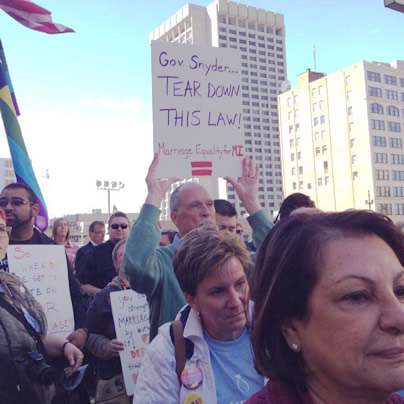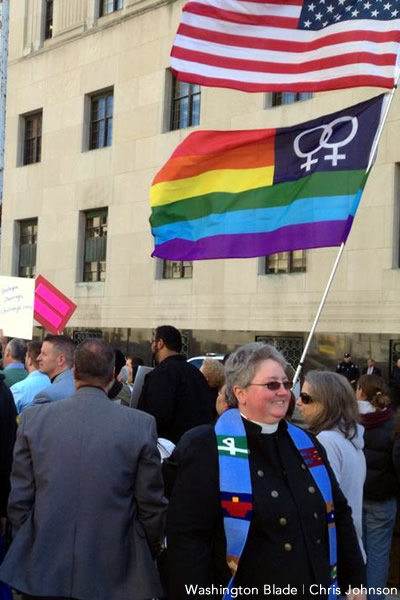Politics
Michigan marriage equality supporters rally
Attendees carry signs showing support for lesbian plaintiff couple, criticizing Gov. Snyder


Rally for same-sex marriage outside Detroit federal courthouse (Washington Blade photo by Chris Johnson).
DETROIT — Same-sex marriage supporters on Tuesday pounced on their opportunity to demonstrate their desire to see it come to Michigan as around 60 people gathered at a rally outside the Detroit federal courthouse before arguments in a marriage lawsuit.
Waiving rainbow flags and signs expressing their solidarity, supporters gathered in the parking lot before the Theodore Levin U.S. Courthouse. The lesbian plaintiff couple in the lawsuit, April DeBoer and Jayne Rowse, was among those who addressed the crowd.
Rowze, who filed her lawsuit with DeBoer in late 2012, said she never envisioned she would be leading the way for marriage equality in Michigan when she was growing up on a farm in Indiana.
“If you would have told me when I was 18 years old and living in Indiana on a farm that I was going to be up here talking about gay marriage, I would have told you, you lost your mind,” Rowze said. “Also, I would have said you had lost your mind if I was living in Michigan.”
Rowze said that her loves DeBoer “with all my heart” and the three kids they are trying to adopt as part of the lawsuit “are the most important things to us, and they always will be the most important things to us.” After closing her remarks by thanking rally attendees, Rowze shouted out, “Go Tigers!” in anticipation of the Detroit Tigers game later that day.
DeBoer stood up on next on the small stool that speakers were using to address the crowd, saying as she climbed aboard in her pumps, “OK, so I might be the next one to fall off this.”
Thanking the crowd for attending, DeBoer said the couple would have liked to take their kids to their rally, but couldn’t because “they’d have taken all the camera equipment and tried to taking pictures.”
“They know that they’ve had their pictures quite a few times in the last couple of days, but they don’t know the impact of this, and they won’t for quite a few years,” DeBoer said. “I’m kind of happy that they don’t know right at this time what’s going on. I’m happy that they don’t know that they don’t have the same rights as all the other kids they’re going to school with.”
Signs held up by rally attendees demonstrated support for marriage equality and criticized those who were defending the marriage ban. One male attendee held up a sign directed toward Michigan Gov. Rick Snyder, which read, “Gov. Snyder… Tear Down This Law!… Marriage Equality for MI.”
Same-sex marriage opponents were represented by one person pacing back and forth the entrance of the courthouse with a sign that read, “WARNING! GOD draws a line on GAY MARRIAGE. Read Romans 1:24-32. WOE to those who cross it!”
Dana Nessel, one the four attorneys representing the plaintiffs, took note of the protester after thanking the marriage-equality supportive attendees for coming to the rally.
“Thanks to that one random lady across the street, the protester, because what’s a gay rights rally without at least one protester,” Nessel said, eliciting laughter from attendees.
Those gathering at the rally were hoping U.S. District Judge Bernard Friedman would have ruled in favor of marriage equality from the bench immediate following oral arguments in response to the request for summary judgment in the case. Instead, Friedman decided to bring to a trial starting Feb. 25 and asked both sides to prepare a witness list of experts in 30 days time.
Prior to the hearing, DeBoer told the Washington Blade the anticipation was “nerve-wracking” as he hoped Friedman would “do the right thing” and issue a ruling in favor of marriage equality.
Even if the judge had ruled for marriage equality, Rowze said they wouldn’t have immediately wed because she wants to wait in the likely event the case is appealed to the U.S. Sixth Circuit Court of Appeals.
“That means anything that’s been will be pretty much put on hold,” Rowze said. “It could be two or three years before this actually works out, that we’re recognized as legally married or not, and in the interim, our kids still aren’t protected, there’s nothing that’s going to change because they’re still going to stay you’re marriage is on hold until we figure this out.”
After DeBoer told the Blade she’d hold off on applying for a marriage license, a female bystander at rally declared, “It doesn’t matter; they’re already married.”
Following the hearing, neither DeBoer nor Rowze made an appearance to speak publicly. Representing their viewpoint was Nessel, who relayed to the media her clients feelings about the decision to go to trial.
“Obviously, we were all hoping for an immediate ruling today,” Nessel said. “I think it would have been nice for them, I think it would have been nice for all the LGBT couples in the state, but they understand it’s very a long process. It’s not as quick as some would like, it’s not as quick I would like, but we will eventually prevail in this case.”
Congress
Congress passes ‘Big, Beautiful Bill’ with massive cuts to health insurance coverage
Roughly 1.8 million LGBTQ Americans rely on Medicaid

The “Big, Beautiful Bill” heads to President Donald Trump’s desk following the vote by the Republican majority in the U.S. House of Representatives Thursday, which saw two nays from GOP members and unified opposition from the entire Democratic caucus.
To partially offset the cost of tax breaks that disproportionately favor the wealthy, the bill contains massive cuts to Medicaid and social safety net programs like food assistance for the poor while adding a projected $3.3 billion to the deficit.
Policy wise, the signature legislation of Trump’s second term rolls back clean energy tax credits passed under the Biden-Harris administration while beefing up funding for defense and border security.
Roughly 13 percent of LGBTQ adults in the U.S., about 1.8 million people, rely on Medicaid as their primary health insurer, compared to seven percent of non-LGBTQ adults, according to the UCLA School of Law’s Williams Institute think tank on sexual orientation and gender identities.
In total, the Congressional Budget Office estimates the cuts will cause more than 10 million Americans to lose their coverage under Medicaid and anywhere from three to five million to lose their care under Affordable Care Act marketplace plans.
A number of Republicans in the House and Senate opposed the bill reasoning that they might face political consequences for taking away access to healthcare for, particularly, low-income Americans who rely on Medicaid. Poorer voters flocked to Trump in last year’s presidential election, exit polls show.
A provision that would have blocked the use of federal funds to reimburse medical care for transgender youth was blocked by the Senate Parliamentarian and ultimately struck from the legislation — reportedly after the first trans member of Congress, U.S. Rep. Sarah McBride (D-Del.) and the first lesbian U.S. senator, Tammy Baldwin (D-Wis.), shored up unified opposition to the proposal among Congressional Democrats.
Congress
Ritchie Torres says he is unlikely to run for NY governor
One poll showed gay Democratic congressman nearly tied with Kathy Hochul

Gay Democratic Congressman Ritchie Torres of New York is unlikely to challenge New York Gov. Kathy Hochul (D) in the state’s next gubernatorial race, he said during an appearance Wednesday on MSNBC’s “Morning Joe.”
“I’m unlikely to run for governor,” he said. ““I feel like the assault that we’ve seen on the social safety net in the Bronx is so unprecedented. It’s so overwhelming that I’m going to keep my focus on Washington, D.C.”
Torres and Hochul were nearly tied in a poll this spring of likely Democratic voters in New York City, fueling speculation that the congressman might run. A Siena College poll, however, found Hochul leading with a wider margin.
Back in D.C., the congressman and his colleagues are unified in their opposition to President Donald Trump’s signature legislation, the “Big Beautiful Bill,” which heads back to the House after passing the Senate by one vote this week.
To pay for tax cuts that disproportionately advantage the ultra-wealthy and large corporations, the president and Congressional Republicans have proposed massive cuts to Medicaid and other social programs.
A provision in the Senate version of the bill that would have blocked the use of federal funds to reimburse medical care for transgender youth was blocked by the Senate Parliamentarian and ultimately struck from the legislation, reportedly after pressure from transgender U.S. Rep. Sarah McBride (D-Del.) and lesbian U.S. Sen. Tammy Baldwin (D-Wis.).
Torres on “Morning Joe” said, “The so-called Big Beautiful Bill represents a betrayal of the working people of America and nowhere more so than in the Bronx,” adding, “It’s going to destabilize every health care provider, every hospital.”
Congress
House Democrats oppose Bessent’s removal of SOGI from discrimination complaint forms
Congressional Equality Caucus sharply criticized move

A letter issued last week by a group of House Democrats objects to Treasury Secretary Scott Bessent’s removal of sexual orientation and gender identity as bases for sex discrimination complaints in several Equal Employment Opportunity forms.
Bessent, who is gay, is the highest ranking openly LGBTQ official in American history and the second out Cabinet member next to Pete Buttigieg, who served as transportation secretary during the Biden-Harris administration.
The signatories to the letter include a few out members of Congress, Congressional Equality Caucus chair and co-chairs Mark Takano (Calif.), Ritchie Torres (N.Y.), and Becca Balint (Vt.), along with U.S. Reps. Nikema Williams (Ga.), Hank Johnson (Ga.), Raja Krishnamoorthi (Ill.), Delia Ramirez (Ill.), Joyce Beatty (Ohio), Lloyd Doggett (Texas), Eleanor Holmes Norton (D.C.), Josh Gottheimer (N.J.), and Sylvia Garcia (D-Texas).
The letter explains the “critical role” played by the EEO given the strictures and limits on how federal employees can find recourse for unlawful workplace discrimination — namely, without the ability to file complaints directly with the Employment Opportunity Commission or otherwise engage with the agency unless the complainant “appeal[s] an agency’s decision following the agency’s investigation or request[s] a hearing before an administrative judge.”
“Your attempt to remove ‘gender identity’ and ‘sexual orientation’ as bases for sex discrimination complaints in numerous Equal Employment Opportunity (EEO) forms will create unnecessary hurdles to employees filing EEO complaints and undermine enforcement of federal employee’s nondiscrimination protections,” the members wrote in their letter.
They further explain the legal basis behind LGBTQ inclusive nondiscrimination protections for federal employees in the EEOC’s decisions in Macy v. Holder (2012) and Baldwin v. Foxx (2015) and the U.S. Supreme Court’s decision in Bostock v. Clayton County (2020).
“It appears that these changes may be an attempt by the department to dissuade employees from reporting gender identity and sexual orientation discrimination,” the lawmakers wrote. “Without forms clearly enumerating gender identity and sexual orientation as forms of sex discrimination, the average employee who experiences these forms of discrimination may see these forms and not realize that the discrimination they experienced was unlawful and something that they can report and seek recourse for.”
“A more alarming view would be that the department no longer plans to fulfill its legal obligations to investigate complaints of gender identity and sexual orientation and ensure its
employees are working in an environment free from these forms of discrimination,” they added.
-

 U.S. Supreme Court3 days ago
U.S. Supreme Court3 days agoSupreme Court to consider bans on trans athletes in school sports
-

 Out & About3 days ago
Out & About3 days agoCelebrate the Fourth of July the gay way!
-

 Virginia3 days ago
Virginia3 days agoVa. court allows conversion therapy despite law banning it
-

 Maryland5 days ago
Maryland5 days agoLGBTQ suicide prevention hotline option is going away. Here’s where else to go in Md.












